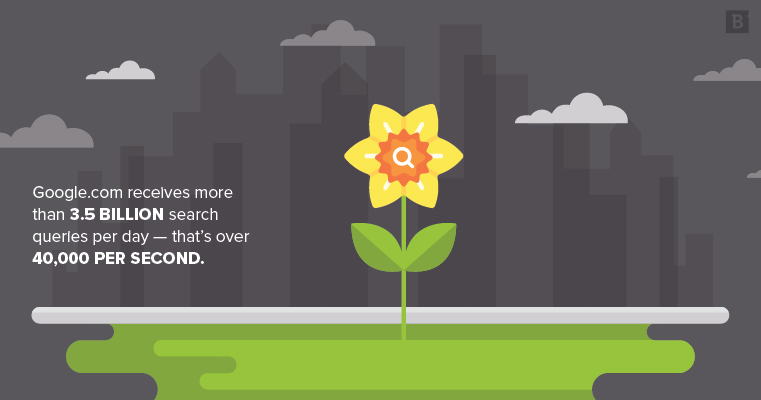If blogging had died, you would have noticed.
The death of blogging has been predicted for years, but the platform has only grown more valuable as marketing tactics evolve and consumers expect more from online content.
As long as people want answers to complex questions, blogs will thrive.
Think about it: When you want to know something quickly, do you crack open a dusty volume of the Encyclopedia Britannica? Do you call 411? Do you write your query on a piece of worn vellum and send it by carrier pigeon?
Or do you ask a search engine?
If you’re like most people, you turn to Google when you need information quickly. In fact, the site receives more than 3.5 billion search queries per day – that’s over 40,000 per second.
When you ask Google a question, one of three things happens: the SERP answers your question directly, the search engine pulls up a few thousand webpages that may hold the answer, or you’re met with an error. When you find information online, there’s a good chance it comes from a blog. A quality blog article will answer just about any question you have on a given subject.
So they’re not dead, but are blogs still relevant?
Considering that you’re reading a blog right now, it should be fairly obvious that blogs are still relevant. Sure, you may not turn to a blog when you need driving directions, but if you want to look up a new recipe, find information about a business topic or plan your vacation, blogs are among your primary sources of information.
If you’re a business owner or marketer, blogs are even more relevant to you. Blogs improve on-site search engine optimization, establish subject matter authority and generate leads.

What’s the purpose of having a blog?
As a platform, blogging may not be dead, but individual blog posts die every day. Most of these likely belong to teenagers who need a digital space to vent their bubbling emotions. Other dead or dying blogs belong to businesses that wrongfully assumed their customers would go out of their way to read long-form advertisements.
In other words, useless blogs die.
Valuable blogs thrive.
Business-oriented blogs die when they cannot garner a readership. Failed blogs tend to miss out on one important fact: No one goes online looking for advertisements. Readers accept ads as a part of life, but no one is really enthused about watching or reading a company’s advertisements. If a blog is really just thinly veiled ad copy, it will send readers bouncing to another website.
Readers come to a blog to learn. They seek knowledge, and they expect answers.
If a blog can provide value before it asks something of a reader, it will be successful. Even if the reader declines to take action, they will have a better opinion of the brand that published the content. Over time, readers that benefit from a brand’s content will be more likely to return. Desirable blog readers need time to get to know your brand before they’ll convert to a client or customer.
Here’s an example: Let’s say you want to learn how to train your new puppy to sit like a good boy. You ask Google how to train a puppy and the search engine returns a million results. You select the first. There, you find a step-by-step guide on how to teach a puppy to sit, as well as additional tips for parents of naughty puppies. At the end of the article, there’s a link to purchase a special puppy training harness. By the time you reach the promotional part of the blog, you already have the information you came for. You can choose to leave the site, or click the link to learn more about the training harness.
If you had come to the site and been shown an advertisement for a training harness, you probably would have left immediately. This is why one of the cardinal rules of blogging is to provide value first.

When you think of your blog as an advertising platform, you’re not thinking about your customer – you’re thinking about the bottom line. A blog should be a resource first and a marketing channel second. Give readers what they want before you ask them to take an action. Heck, sometimes they just want a picture of a good dog.
How does blogging support a marketing strategy?
To be effective, your blog needs to be integrated into your other marketing efforts. The more cohesive your brand messaging is, the better readers will respond to it. If your content does not align across all channels, it will make your organization appear inconsistent at best and two-faced at worst.
An effective integrated communications strategy takes a holistic view of all marketing channels and ensures that messaging, tone and visual style are clear and consistent in every instance. Together, each piece of content supports the overarching brand story. Here’s how it works:
Email campaigns
Let’s say you’ve just published a stellar blog article. You did your research, aligned branded messaging, cited your sources and found the perfect imagery to accompany the post. While you wait for new readers to discover your blog, you should also take steps to ensure that your loyal customers know about it, too.
A brief email summarizing the topic and linking to your website is all it takes to share your new content with current customers. You know they’re already interested, so it’s only a matter of making them aware.
As long as people want answers to complex questions, blogs will thrive.
Social channels
These days, everyone is social online. In person, it might be a different story.
As digital social butterflies, we don’t just want to read about interesting topics, we want to discuss them with others. Social media channels not only allow marketers to reach consumers, but also to establish a community. And like a community newsletter, a blog can serve as a way to inform members of the group about trending topics.
SEO
You want people to find your website – but do they want to find you? By writing to reader needs, you ensure that your content answers questions and provides value. By fully satisfying the intent of specific keywords, you can ensure that your site uses the same language as your readership and answers their questions. This is a basic component of SEO. Answer the reader’s questions in his or her own words, and you’ll gain a dedicated follower. In the long run, doing so can boost domain authority and establish your brand as a trusted thought leader.
Is it worth starting a blog in 2018?
A business that markets online needs a blog. Blogs drive traffic to your website’s landing pages, establish authority and leadership, grow brand awareness, generate leads and support your overall marketing strategy.
If you already have a blog, go back and assess your old posts to make sure they answer questions and satisfy search intent. If your brand isn’t blogging, it’s time to start.





